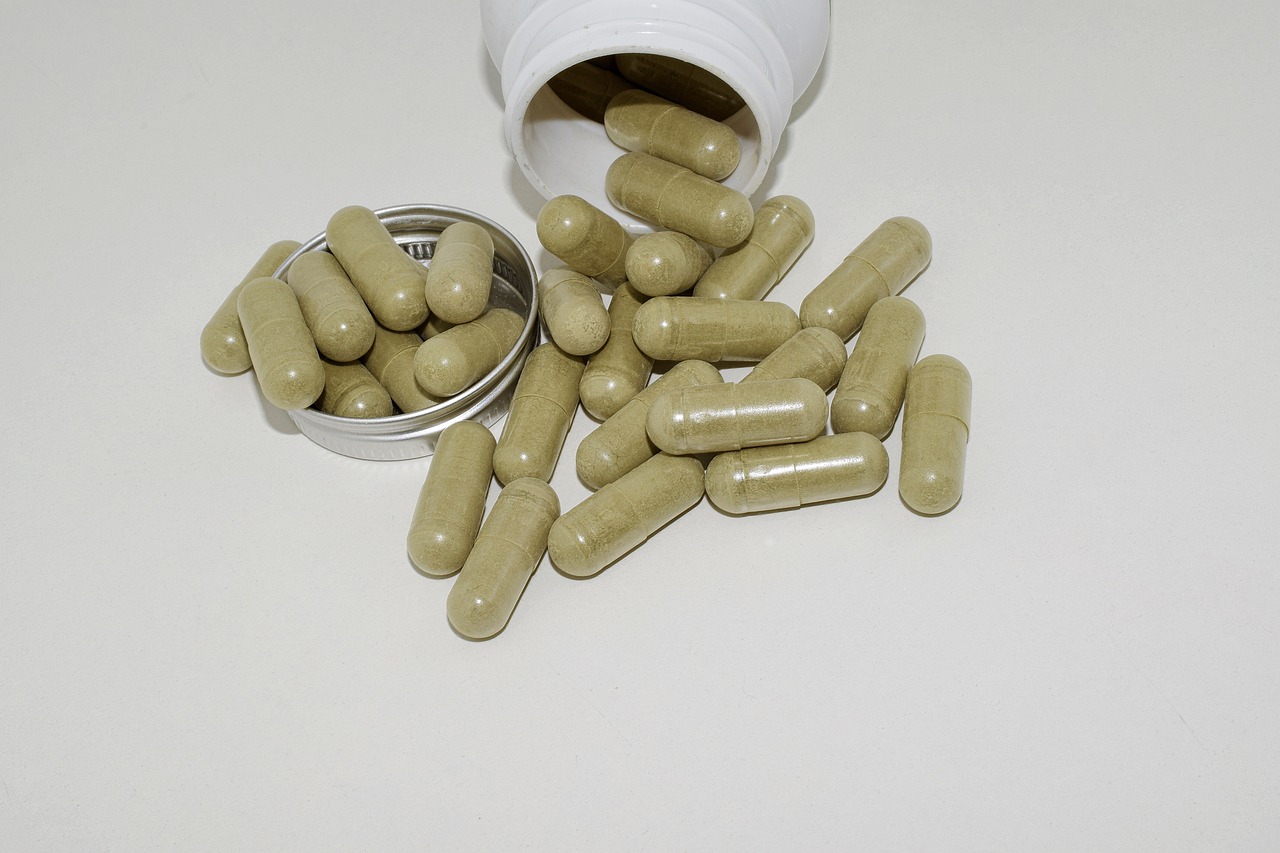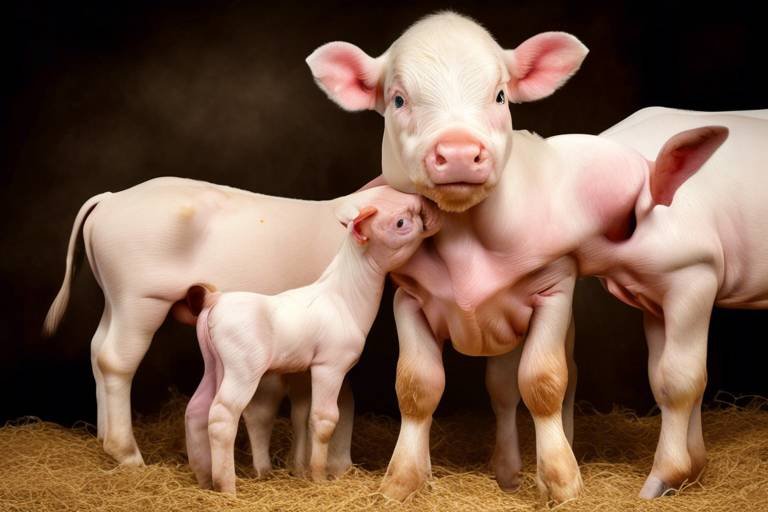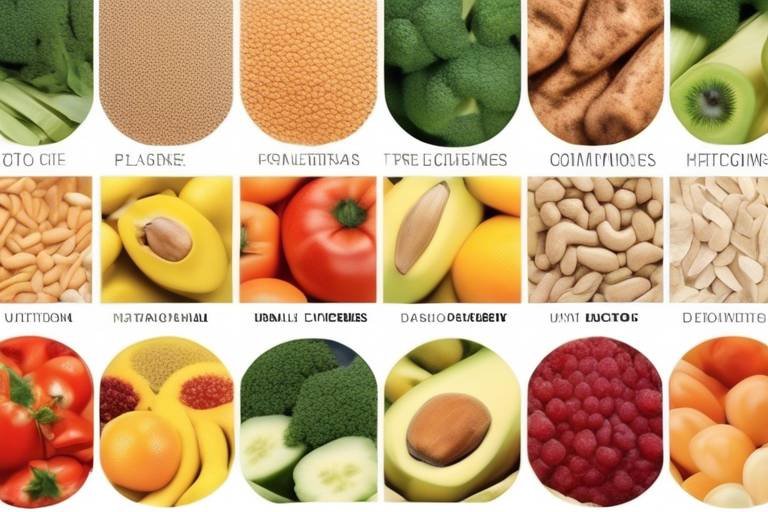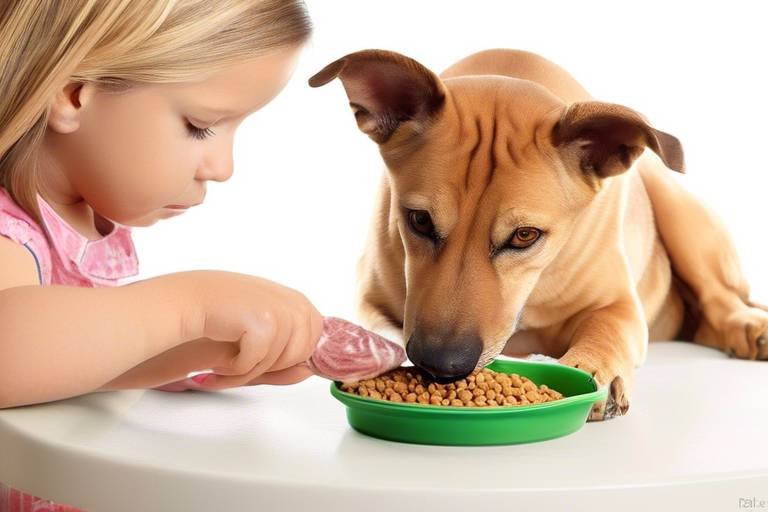The Importance of Nutritional Guidelines for Breeders
In the world of animal breeding, the significance of nutritional guidelines cannot be overstated. Just like humans, breeding animals require a well-balanced diet to thrive. These guidelines serve as a roadmap, guiding breeders in providing the right nutrients that enhance not only the health of the animals but also their productivity. Imagine trying to build a house without a blueprint; the end result might not be what you envisioned. Similarly, without proper nutritional guidelines, breeders may face challenges that affect growth, reproduction, and overall well-being of their animals.
Understanding the nutritional needs of different species is crucial. Each animal has unique requirements based on its age, breed, and purpose. For instance, a pregnant dog has different nutritional needs compared to a lactating cat or a growing puppy. By adhering to clear nutritional guidelines, breeders can ensure that their animals receive the necessary vitamins, minerals, and energy levels to support optimal growth and reproduction.
Moreover, the impact of nutrition on the overall health of breeding animals is profound. A well-nourished animal is less susceptible to diseases, has a stronger immune system, and often exhibits better temperament and behavior. This not only enhances the quality of life for the animals but also translates into better productivity for breeders, as healthy animals are more likely to reproduce successfully and raise healthier offspring.
In essence, nutritional guidelines are not just recommendations; they are essential tools for breeders. They help in making informed decisions about feeding practices, ensuring that every animal in their care receives a diet tailored to its specific needs. This proactive approach can lead to impressive results, including increased fertility rates, improved offspring quality, and a thriving breeding program.
As we delve deeper into the various aspects of nutritional guidelines, it becomes evident that they are foundational to successful breeding. From understanding the essential nutrients required by breeding animals to recognizing the signs of nutritional deficiencies, breeders must equip themselves with the knowledge to make the best choices for their animals. After all, a well-fed animal is a happy and productive one!

Understanding Nutritional Needs
When it comes to breeding animals, understanding their nutritional needs is like having the blueprint to a thriving ecosystem. Just as a gardener carefully selects the right soil and nutrients for their plants, breeders must delve into the specific dietary requirements of their animals to ensure they flourish. This involves a comprehensive understanding of essential nutrients, energy levels, and the necessary dietary adjustments that come into play at different life stages.
Every breeding animal has unique nutritional requirements that can vary based on species, age, and reproductive status. For instance, a lactating mother will have different needs compared to a growing youngling. The key is to recognize that proper nutrition is not just about filling a bowl with food; it’s about providing a balanced diet that supports optimal growth and reproductive success. To illustrate this, let’s break down some essential nutrients:
| Nutrient | Role in Animal Health |
|---|---|
| Proteins | Essential for muscle development and tissue repair. |
| Fats | Provide energy and support cell structure. |
| Carbohydrates | Serve as a primary energy source. |
| Vitamins | Support various bodily functions, including immune response. |
| Minerals | Crucial for bone health and metabolic processes. |
Moreover, energy levels are a critical aspect of an animal's diet that cannot be overlooked. Breeders need to ensure that their animals receive sufficient calories to support their daily activities, especially during critical periods such as pregnancy and lactation. Energy deficits can lead to poor growth rates, decreased fertility, and even health complications. It’s like trying to run a marathon on an empty tank; you simply can’t expect peak performance without the right fuel.
In addition to understanding the basic nutritional components, breeders must also be aware of how to adjust diets based on the life stages of their animals. For instance, young animals require diets rich in protein and energy to support rapid growth, while adults may need a more balanced approach focusing on maintenance and reproduction. This adaptability is crucial for ensuring that each animal receives the right nutrients at the right time.
In conclusion, understanding the nutritional needs of breeding animals is fundamental to their health and productivity. By equipping themselves with knowledge about essential nutrients, energy requirements, and necessary dietary adjustments, breeders can create optimal environments for their animals to thrive. It’s not just about feeding; it’s about nurturing life and ensuring that each animal reaches its full potential.
- What are the most essential nutrients for breeding animals? Essential nutrients include proteins, fats, carbohydrates, vitamins, and minerals.
- How can I tell if my animal is receiving adequate nutrition? Look for signs such as healthy coat condition, energy levels, and reproductive success.
- Do different life stages require different diets? Yes, young animals, adults, and lactating mothers have varying nutritional needs.

Impact on Reproductive Performance
When it comes to breeding animals, the impact of nutrition on reproductive performance cannot be overstated. Proper nutrition is like the foundation of a house; without it, everything else can crumble. Breeders need to understand that a well-balanced diet not only supports the general health of the animals but also plays a pivotal role in their reproductive success. Imagine trying to run a marathon on an empty stomach—it's simply not feasible! Similarly, breeding animals require the right nutrients to thrive and reproduce effectively.
Research shows that animals receiving a balanced diet have significantly higher fertility rates compared to those on inadequate diets. This is because essential nutrients fuel the hormonal functions and reproductive processes in animals. For instance, proteins are crucial for the production of reproductive hormones, while carbohydrates provide the energy needed for mating and gestation. Without these, the chances of successful breeding diminish, leading to poor reproductive outcomes.
Moreover, the quality of offspring is directly influenced by the nutritional status of the breeding animals. When breeders prioritize a nutritionally rich diet, they are investing in the future health and productivity of the next generation. Healthy, well-nourished parents are more likely to produce strong, vigorous offspring that can thrive in their environments. In contrast, a lack of proper nutrition can lead to weak offspring, increasing mortality rates and decreasing overall productivity.
To illustrate the importance of nutrition on reproductive performance, consider the following table that highlights how different nutrients contribute to reproductive health:
| Nutrient | Role in Reproduction |
|---|---|
| Proteins | Essential for hormone production and tissue development |
| Fats | Provide energy and support hormone synthesis |
| Vitamins | Critical for reproductive function and fetal development |
| Minerals | Support bone development and reproductive health |
In summary, the link between nutrition and reproductive performance is undeniable. Breeders who invest time and resources into understanding and implementing proper nutritional guidelines will see the fruits of their labor in the form of healthier animals and higher reproductive success rates. It’s not just about feeding animals; it’s about nurturing their potential for growth and reproduction. So, why leave it to chance? Prioritize nutrition and watch as your breeding program flourishes!
- What are the essential nutrients for breeding animals? Essential nutrients include proteins, fats, vitamins, and minerals that support overall health and reproductive success.
- How can I tell if my breeding animals are well-nourished? Signs of good nutrition include healthy body condition, active behavior, and regular reproductive cycles.
- What should I do if I notice signs of nutritional deficiency? Consult with a veterinarian or animal nutritionist to adjust the diet and address any deficiencies promptly.
Essential Vitamins and Minerals
When it comes to breeding animals, are the unsung heroes of nutritional health. Just like how a well-tuned engine requires specific oils and fluids to run smoothly, breeding animals need a carefully balanced intake of nutrients to thrive. Without these vital components, even the best breeding practices can fall short. So, what are the key vitamins and minerals that breeders should focus on?
First and foremost, vitamins like A, D, E, and K play critical roles in animal health. Vitamin A, for instance, is essential for vision and immune function, while Vitamin D helps in calcium absorption, crucial for strong bones and overall health. Vitamin E acts as an antioxidant, protecting cells from damage, and Vitamin K is vital for blood clotting. These vitamins are not just fancy terms; they are the building blocks of a robust reproductive system.
Now, let’s talk about minerals. Calcium and phosphorus are two heavyweights in the mineral category that breeders must pay special attention to. These minerals work hand-in-hand to ensure proper bone development and reproductive success. A deficiency in either can lead to serious health issues, such as weak bones or reproductive failures. In fact, the ideal calcium-to-phosphorus ratio in animal diets is typically around 2:1, which helps maintain optimal health.
| Vitamin/Mineral | Function | Sources |
|---|---|---|
| Vitamin A | Supports vision and immune function | Carrots, leafy greens |
| Vitamin D | Enhances calcium absorption | Fish liver oil, sunlight |
| Vitamin E | Acts as an antioxidant | Nuts, seeds, green leafy vegetables |
| Calcium | Essential for bone health | Dairy products, leafy greens |
| Phosphorus | Works with calcium for strong bones | Meat, fish, eggs |
However, vitamins and minerals alone won’t do the trick. They need to be part of a balanced diet that meets the specific needs of breeding animals. This means considering factors like age, weight, and reproductive status. For instance, pregnant or lactating animals require higher levels of certain nutrients to support their young. Therefore, it’s crucial for breeders to regularly assess their animals' diets and make necessary adjustments.
In summary, understanding the essential vitamins and minerals that contribute to reproductive health is vital for any breeder. By prioritizing these nutrients, breeders can significantly enhance their animals' overall well-being and productivity. Remember, a well-nourished animal is not just healthy; it's also more likely to produce healthy offspring, ensuring the future of your breeding program.
Vitamin A and Reproduction
Vitamin A is not just a vitamin; it's a crucial player in the intricate dance of reproduction among breeding animals. Think of it as the maestro conducting an orchestra, ensuring that every note is played at just the right time. This vital nutrient is essential for hormone production, which is fundamental for successful reproduction. Without adequate Vitamin A, breeding animals may struggle with fertility issues, leading to disappointing outcomes for breeders.
One of the most significant roles of Vitamin A is its involvement in the synthesis of reproductive hormones. These hormones are responsible for regulating the reproductive cycle, including estrus and ovulation in females. A deficiency can disrupt these processes, resulting in irregular cycles or even failure to conceive. In males, Vitamin A plays a role in the production of sperm, affecting both quantity and quality. This is why ensuring that breeding animals receive sufficient Vitamin A is paramount for any breeder aiming for optimal reproductive success.
Moreover, Vitamin A is vital for the development of healthy embryos. It contributes to the formation of vital organs and systems in the early stages of gestation. Without it, the risk of congenital defects increases, and the overall health of the offspring can be compromised. Therefore, breeders should prioritize the inclusion of Vitamin A in their animals' diets, particularly during critical periods such as pre-breeding and gestation.
Incorporating Vitamin A into the diet can be achieved through various sources, including:
- Carrots: A rich source of beta-carotene, which the body converts into Vitamin A.
- Leafy greens: Spinach and kale are excellent options that provide high levels of this essential nutrient.
- Animal liver: An incredibly concentrated source of Vitamin A, though it should be fed in moderation.
Understanding the importance of Vitamin A in reproduction is just the first step. Breeders should also consider the overall balance of their animals' diets to ensure that they are not only getting enough of this vitamin but also other essential nutrients that work synergistically to promote health and reproductive success. Regular consultations with a veterinarian or animal nutritionist can help in formulating a diet that meets the specific needs of breeding animals, ultimately leading to healthier animals and more successful breeding outcomes.
Importance of Calcium and Phosphorus
When it comes to the health and productivity of breeding animals, calcium and phosphorus are two minerals that cannot be overlooked. These nutrients serve as the backbone for many bodily functions, particularly in the realms of bone development and reproductive success. Imagine a house built on a shaky foundation; without adequate calcium and phosphorus, the skeletal structure of your animals can become weak, leading to a cascade of health issues that could affect their overall performance.
Calcium is primarily known for its role in developing strong bones and teeth. It is also crucial for muscle function and blood clotting. In breeding animals, a deficiency in calcium can lead to serious conditions such as milk fever in lactating females, which can jeopardize both the mother and her offspring. On the other hand, phosphorus plays a vital role in energy metabolism and is essential for the formation of DNA and RNA, which are necessary for cell growth and reproduction. The balance between these two minerals is critical; too much of one can lead to a deficiency of the other, creating a precarious situation for your animals.
To ensure that breeding animals receive adequate amounts of calcium and phosphorus, breeders should focus on the following:
- Incorporating high-quality feed that is specifically formulated for breeding animals.
- Regularly testing the mineral content of feed and forage to adjust diets accordingly.
- Consulting with a veterinarian or animal nutritionist to create a balanced feeding program.
Moreover, the ratio of calcium to phosphorus should ideally be around 1.5:1 to 2:1, depending on the specific needs of the species being bred. For example, dogs and cats may require different ratios compared to cattle or horses. Therefore, understanding the specific needs of your breeding stock is essential for achieving optimal health and productivity.
In summary, calcium and phosphorus are not just mere additives in animal feed; they are critical components that contribute to the overall well-being of breeding animals. By prioritizing these minerals in your feeding regimen, you can ensure that your animals grow strong, reproduce effectively, and lead healthy lives. Remember, a well-nourished animal is not just a productive one; it is also a happy one!
Dietary Adjustments for Different Life Stages
When it comes to breeding animals, one size does not fit all, especially regarding their diets. Just like humans, animals go through various life stages, each with unique nutritional requirements. Understanding these phases is crucial for breeders looking to optimize growth, reproduction, and overall health. For instance, the dietary needs of a growing puppy differ significantly from those of a pregnant dog or a lactating mother. By tailoring diets to these specific life stages, breeders can ensure that their animals receive the right balance of nutrients at the right time.
During the growth phase, young animals require diets rich in proteins, vitamins, and minerals to support their rapid development. This is the time when their bones, muscles, and immune systems are forming. It's important to provide a diet that not only meets their energy needs but also promotes healthy growth. On the other hand, when animals reach the reproductive stage, the focus shifts toward enhancing fertility and supporting the developing offspring. This means incorporating higher levels of certain nutrients, such as folic acid and omega-3 fatty acids, which are essential for reproductive health.
Furthermore, the lactation stage brings its own set of dietary demands. Nursing mothers need significantly more calories and nutrients to produce milk and care for their young. This is where the importance of a balanced diet becomes even more pronounced. A lactating animal's diet should be rich in energy, protein, and calcium to ensure both the mother and the offspring thrive. Without proper nutrition during this critical period, not only can the health of the mother suffer, but the growth and development of her young can also be compromised.
To illustrate the varying dietary needs across life stages, consider the following table:
| Life Stage | Key Nutritional Focus | Examples of Nutrients |
|---|---|---|
| Growth | High protein and energy | Proteins, Vitamins A, D, E |
| Reproductive | Enhanced fertility and fetal development | Folic acid, Omega-3 fatty acids |
| Lactation | Increased calories and nutrients for milk production | Calcium, Protein, Energy |
In summary, recognizing and adjusting the diets of breeding animals according to their life stages is not just a good practice—it's essential for their health and productivity. By being proactive and informed about these changes, breeders can create a nurturing environment that fosters optimal growth and reproductive success. After all, a well-fed animal is a happy and productive one!
1. Why is it important to adjust diets for different life stages?
Adjusting diets ensures that animals receive the right nutrients at the right time, which is crucial for their growth, reproduction, and overall health.
2. What are the key nutrients needed during the growth phase?
Young animals require high levels of protein, vitamins, and minerals to support their rapid development and immune system.
3. How can I tell if my breeding animal is not getting enough nutrition?
Signs of nutritional deficiencies can include poor coat condition, low energy levels, reproductive issues, and stunted growth in young animals.
4. Should I consult a nutritionist for my breeding animals?
Yes, consulting with a nutritionist can help you create tailored feeding plans that meet the specific needs of your breeding animals at various life stages.

Common Nutritional Deficiencies
Nutritional deficiencies can wreak havoc on the health and productivity of breeding animals. These deficiencies often stem from an imbalanced diet or a lack of essential nutrients, which can lead to a myriad of health issues. As a breeder, it's crucial to identify these common deficiencies early on to prevent long-term consequences. For instance, many breeders might overlook the importance of certain vitamins and minerals, thinking that a general feed will suffice. However, each animal has its own unique nutritional requirements based on factors like age, breed, and reproductive status. Ignoring these needs can lead to poor growth, reduced fertility, and compromised overall health.
Some of the most prevalent nutritional deficiencies include:
- Protein Deficiency: Insufficient protein can hinder growth and reproductive performance in breeding animals. Protein is vital for muscle development and hormone production, making it essential for both pregnant and lactating animals.
- Calcium and Phosphorus Deficiency: These two minerals are crucial for bone development and reproductive success. A lack of calcium can lead to weak bones, while phosphorus is essential for energy metabolism.
- Vitamin A Deficiency: This vitamin plays a key role in reproductive health and immune function. Without adequate Vitamin A, animals may experience difficulties in reproduction and increased susceptibility to diseases.
- Vitamin E and Selenium Deficiency: This duo is important for reproductive health, particularly in preventing muscle degeneration and improving fertility rates.
Recognizing the signs of these deficiencies is essential for breeders. Common indicators include poor coat condition, lethargy, reduced appetite, and reproductive issues. For example, if a breeding animal is not cycling regularly, it might be a sign of nutritional imbalance. By paying close attention to these signs, breeders can take proactive measures to address deficiencies before they escalate into more serious health problems.
Addressing nutritional deficiencies involves a combination of strategies. First, it’s important to conduct a thorough assessment of the current diet being fed to the animals. This can include analyzing feed composition and ensuring that it meets the specific needs of each animal. Consulting with a veterinarian or a nutritionist can provide insights into necessary dietary adjustments. Additionally, incorporating high-quality feed supplements can help bridge the gap in nutrition. For instance, if a deficiency in calcium is identified, adding a calcium supplement can significantly improve bone health and reproductive outcomes.
Ultimately, understanding and addressing common nutritional deficiencies is not just about keeping animals healthy; it’s about enhancing their productivity and ensuring the success of breeding programs. By focusing on balanced nutrition, breeders can set their animals up for success, leading to healthier offspring and a more productive breeding operation.
Q1: How can I tell if my breeding animals are nutritionally deficient?
A1: Look for signs such as poor coat condition, lethargy, reduced appetite, and reproductive issues. Regular health checks and consultations with a nutritionist can also help identify deficiencies.
Q2: What are the most important nutrients for breeding animals?
A2: Essential nutrients include protein, calcium, phosphorus, Vitamin A, Vitamin E, and selenium. Each plays a crucial role in growth, reproduction, and overall health.
Q3: How often should I adjust my animals' diets?
A3: Diets should be monitored regularly and adjusted based on the animals' life stages, health conditions, and reproductive status. Consulting with a nutritionist can provide tailored recommendations.
Signs of Nutritional Deficiency
As a breeder, being vigilant about the health of your animals is paramount, and one of the first steps in this process is recognizing the . Just like humans, animals can exhibit various symptoms when their diets are lacking essential nutrients. These signs can be subtle or glaringly obvious, but understanding them can make a significant difference in maintaining the health and productivity of your breeding stock.
One of the most common indicators of nutritional deficiency is a decline in overall health. This can manifest in different ways, such as weight loss, poor coat condition, or lethargy. For instance, if you notice that your animals are not as lively as they used to be, it could be a sign that their energy levels are compromised due to inadequate nutrient intake. Additionally, reproductive issues such as irregular heat cycles or low fertility rates can also signal nutritional shortfalls. These issues can lead to decreased litter sizes or even failed pregnancies, which can be devastating for breeders.
Another critical area to monitor is the physical appearance of your animals. Nutritional deficiencies can lead to noticeable changes in their coat, skin, and body condition. For example, a lack of essential fatty acids may result in a dry, flaky coat, while vitamin deficiencies can lead to skin lesions or excessive shedding. If you observe these changes, it’s crucial to assess their diet and make the necessary adjustments.
Moreover, behavioral changes can also hint at underlying nutritional issues. Animals may become more aggressive or exhibit signs of stress and anxiety when they are not receiving the right nutrients. This can affect their overall well-being and complicate breeding efforts. It's important to note that these signs can sometimes overlap with other health problems, so a thorough examination by a veterinarian may be necessary to pinpoint the exact cause.
To help you identify these signs effectively, here’s a quick summary of some common indicators of nutritional deficiency:
- Weight loss or poor body condition
- Poor coat quality (dry, flaky, or excessive shedding)
- Lethargy or decreased energy levels
- Reproductive issues (irregular cycles, low fertility)
- Behavioral changes (aggression, anxiety)
By keeping an eye out for these signs, breeders can take proactive steps to address nutritional deficiencies before they escalate into more serious health concerns. Remember, the health of your breeding animals directly influences their productivity and, ultimately, your success as a breeder. So, if you notice any of these symptoms, don’t hesitate to consult with a nutrition expert or veterinarian to reassess your feeding program.
- What are the most common nutritional deficiencies in breeding animals?
Common deficiencies include lack of vitamins A, D, E, and minerals like calcium and phosphorus. - How can I tell if my animal is not getting enough nutrients?
Look for signs such as weight loss, poor coat condition, reproductive issues, and unusual behavior. - What should I do if I suspect a nutritional deficiency?
Consult with a veterinarian or a nutritionist to evaluate your animal's diet and make necessary adjustments.
Strategies to Mitigate Deficiencies
When it comes to ensuring the health and productivity of breeding animals, addressing nutritional deficiencies is not just a good idea—it's essential. Breeders must take proactive steps to identify and correct any gaps in their animals' diets. One of the first strategies is to conduct a thorough nutritional assessment. This involves evaluating the current diet and understanding the specific needs of each animal based on factors such as age, breed, and reproductive status. By doing so, breeders can pinpoint potential deficiencies that may be lurking beneath the surface.
Another effective strategy is incorporating supplements into the diet. Nutritional supplements can provide the necessary vitamins and minerals that might be lacking in regular feed. For instance, if a breeder identifies a deficiency in calcium or phosphorus, they might consider adding a mineral supplement to the feed. However, it’s crucial to consult with a veterinarian or an animal nutritionist to determine the appropriate dosage and type of supplement to use.
Furthermore, diversifying the diet can also play a key role in mitigating deficiencies. Feeding a variety of high-quality ingredients not only enhances the nutritional profile of the diet but also keeps the animals engaged and interested in their food. Breeders can include a mix of grains, legumes, and forage, ensuring that the animals receive a broad spectrum of nutrients. For example, including leafy greens can boost vitamin intake, while grains can provide essential energy sources.
Regular health check-ups are another vital strategy. By monitoring the animals' health, breeders can catch any signs of nutritional deficiencies early on. Indicators such as poor coat condition, decreased energy levels, or reproductive issues can signal that adjustments are needed in the diet. Keeping a close eye on these signs allows for timely interventions that can significantly improve overall health and productivity.
Additionally,
- Educating oneself about the nutritional needs of breeding animals is crucial. Understanding the specific requirements for different life stages helps in crafting a tailored feeding plan.
- Establishing a routine feeding schedule can also help ensure that animals receive their nutrients consistently, reducing the risk of deficiencies.
In conclusion, mitigating nutritional deficiencies in breeding animals requires a multifaceted approach. From conducting nutritional assessments and incorporating supplements to diversifying diets and regular health monitoring, breeders have numerous strategies at their disposal. By being proactive and informed, they can ensure their animals not only thrive but also reach their full reproductive potential.
1. What are the common signs of nutritional deficiencies in breeding animals?
Common signs include poor coat condition, lethargy, reproductive issues, and weight loss. If you notice any of these symptoms, it may be time to reassess your animal's diet.
2. How can I determine the specific nutritional needs of my breeding animals?
Consulting with a veterinarian or an animal nutritionist is the best way to understand the unique dietary requirements based on your animals' age, breed, and reproductive status.
3. Are supplements necessary for breeding animals?
While not always necessary, supplements can help fill nutritional gaps, especially if deficiencies are identified in the diet. It's essential to choose the right supplements and dosages based on expert advice.
4. How often should I monitor my breeding animals' health?
Regular monitoring is key—ideally, you should conduct health check-ups at least once a month or whenever you notice any changes in behavior or condition.

Implementing Nutritional Guidelines
Establishing clear nutritional guidelines is a cornerstone for breeders aiming to enhance the health and productivity of their animals. These guidelines serve as a roadmap, helping breeders navigate the complex world of animal nutrition. But how do you create and implement these guidelines effectively? It starts with understanding the specific needs of your breeding animals and tailoring diets accordingly. This involves not only selecting the right ingredients but also considering the timing of feedings and the overall feeding strategy.
One of the first steps in implementing nutritional guidelines is to develop a comprehensive feeding program. This program should be based on the age, weight, and reproductive status of the animals. For instance, pregnant or lactating animals have different nutritional requirements compared to those that are not breeding. By categorizing your animals into different life stages, you can better address their unique needs. Regular assessments of their health and performance will also inform necessary adjustments to their diets.
Moreover, consulting with nutrition experts can significantly enhance the effectiveness of your feeding program. These professionals can provide insights into the latest research and trends in animal nutrition, allowing you to make informed decisions. They can help you formulate a diet that not only meets the basic nutritional requirements but also supports optimal growth and reproductive performance. Collaborating with a nutritionist can be particularly beneficial when you are faced with specific challenges, such as managing nutritional deficiencies or optimizing feed efficiency.
Another critical aspect of implementing nutritional guidelines is monitoring and adjusting diets based on observed outcomes. Breeders should regularly evaluate the health and performance of their animals. Are they gaining weight appropriately? Are the reproductive rates meeting expectations? By keeping a close eye on these indicators, you can make timely adjustments to the diet. For example, if you notice that a group of animals is not gaining weight as expected, it may be time to reassess their feed composition or feeding frequency.
It's also essential to maintain detailed records of feeding practices and animal performance. This data can be invaluable when it comes to making informed decisions about nutritional adjustments. By analyzing trends over time, you can identify patterns that may indicate a need for dietary changes. For instance, if you consistently observe lower fertility rates during certain seasons, it might be worth investigating whether the diets during those times align with the animals' needs.
In summary, implementing nutritional guidelines is not a one-time task but an ongoing process that requires diligence and adaptability. By developing a structured feeding program, consulting with experts, and continuously monitoring your animals' health, you can create an environment where breeding animals thrive. This will ultimately lead to improved reproductive outcomes, healthier offspring, and a more productive breeding operation.
- What are the key components of a nutritional guideline for breeding animals? A comprehensive nutritional guideline should include essential nutrients, energy levels, and specific dietary adjustments based on life stages.
- How often should I consult with a nutritionist? Regular consultations, especially during critical phases like breeding and lactation, are recommended to ensure optimal dietary plans.
- What signs should I look for to determine if my animals are receiving adequate nutrition? Look for indicators such as weight gain, reproductive performance, and overall health. If you notice any issues, it may be time to reassess their diet.
Consulting with Nutrition Experts
When it comes to the health and productivity of breeding animals, is not just a good idea—it's essential. These professionals bring a wealth of knowledge about the specific dietary needs of various species, ensuring that breeders can make informed decisions. Think of nutritionists as the architects of animal diets; they design feeding programs that are tailored to the unique needs of each animal, much like how a tailor crafts a suit that fits perfectly.
One of the primary advantages of working with a nutrition expert is their ability to assess the current diet of your breeding animals. They can identify any gaps or imbalances that may be affecting growth, reproduction, or overall health. For instance, if a breeder notices that their animals are not achieving optimal weight or reproductive performance, a nutritionist can analyze the nutritional content of the feed and suggest necessary adjustments. This could involve adding specific vitamins, minerals, or even changing the type of feed altogether.
Moreover, nutrition experts can help breeders navigate the complex world of nutritional supplements. With so many products on the market, it can be overwhelming to determine which ones are truly beneficial. A qualified nutritionist can provide guidance on the most effective supplements for enhancing reproductive performance, ensuring that breeders invest their resources wisely.
To further illustrate the importance of this collaboration, consider the following table that outlines some key benefits of consulting with nutrition experts:
| Benefit | Description |
|---|---|
| Customized Diet Plans | Nutritionists create tailored feeding programs based on the specific needs of each breeding animal. |
| Identifying Nutritional Deficiencies | Experts can pinpoint deficiencies that may be hindering growth or reproductive success. |
| Optimizing Supplement Use | They guide breeders on effective use of supplements to enhance animal health. |
| Monitoring Progress | Nutritionists help track the effects of dietary changes, allowing for timely adjustments. |
Additionally, regular consultations with nutrition experts can foster a deeper understanding of how different life stages affect the nutritional needs of breeding animals. For example, the dietary requirements of a pregnant animal significantly differ from those of a lactating one. By working with a nutritionist, breeders can ensure they are providing the right nutrition at the right time, which can lead to healthier offspring and improved productivity.
In conclusion, engaging with nutrition experts is a proactive step that breeders can take to enhance the well-being of their animals. It’s about building a partnership that not only focuses on immediate needs but also on long-term health and productivity. So, if you’re serious about breeding, consider reaching out to a nutritionist—your animals will thank you for it!
- How often should I consult with a nutrition expert? It’s recommended to consult with a nutritionist at least once a year, or more frequently if you notice changes in your animals' health or performance.
- Can I create a diet plan without a nutritionist? While it’s possible to create a basic diet plan, consulting a nutritionist ensures that you cover all essential nutrients and avoid deficiencies.
- What should I look for in a nutrition expert? Look for someone with experience in animal nutrition, preferably with a background in the specific species you are breeding.
Monitoring and Adjusting Diets
Monitoring and adjusting diets for breeding animals is not just a good idea; it's a necessity! Think of it as a fine-tuning process, much like adjusting the strings on a guitar to ensure it plays beautifully. Just as musicians must listen to their instruments, breeders must pay close attention to their animals' health and performance. Regular observation helps identify any changes in behavior, weight, or overall vitality that might indicate nutritional imbalances.
One effective way to monitor dietary impact is by keeping detailed records of each animal's growth, reproductive performance, and health status. By tracking these metrics, breeders can spot trends over time and make informed decisions about dietary adjustments. For instance, if a particular breed is not gaining weight as expected, it might be time to reassess their energy intake or the balance of macronutrients in their diet.
Moreover, it’s essential to remember that animals, like humans, have unique dietary needs that can change based on various factors, including age, activity level, and reproductive status. For example, a lactating female may require a higher protein intake compared to a non-pregnant one. Therefore, breeders should be flexible and ready to adapt their feeding programs. This means regularly evaluating the nutritional content of the feed and adjusting it as necessary to meet the evolving needs of the animals.
Here are some practical strategies for monitoring and adjusting diets:
- Regular Health Check-Ups: Schedule veterinary visits to assess the animals' health and nutritional status.
- Feed Analysis: Conduct regular analyses of feed to ensure it meets the necessary nutritional standards.
- Behavioral Observations: Keep an eye on eating habits and any changes in activity levels, as these can be indicators of dietary sufficiency.
- Weight Monitoring: Weigh animals regularly to track growth patterns and identify any sudden weight loss or gain.
By implementing these strategies, breeders can ensure that their animals receive the right nutrients at the right times, ultimately leading to healthier animals and better breeding outcomes. Just as a gardener nurtures their plants, breeders must cultivate their animals’ diets with care and attention. By doing so, they not only enhance the productivity of their breeding stock but also contribute to the overall well-being of the animals they care for.
Q: How often should I monitor my breeding animals' diets?
A: It's advisable to monitor diets regularly, ideally on a weekly basis, to ensure that any necessary adjustments can be made promptly based on observed health and performance changes.
Q: What signs should I look for to determine if my animals need dietary adjustments?
A: Look for changes in weight, energy levels, coat condition, and reproductive performance. Any sudden shifts in these areas may indicate that dietary adjustments are needed.
Q: Can I consult a nutritionist for my breeding program?
A: Absolutely! Consulting with a nutritionist can provide valuable insights and tailored feeding plans that meet the specific needs of your breeding animals.
Frequently Asked Questions
- What are the essential nutrients that breeding animals need?
Breeding animals require a balanced diet that includes essential nutrients such as proteins, carbohydrates, fats, vitamins, and minerals. Key vitamins like A, D, E, and K, along with minerals such as calcium and phosphorus, play critical roles in growth, reproduction, and overall health.
- How does nutrition impact reproductive performance?
Proper nutrition is fundamental to reproductive success. A balanced diet can significantly enhance fertility rates and improve the quality of offspring. Nutritional deficiencies can lead to issues like poor conception rates and lower litter sizes, making it vital for breeders to focus on optimal nutrition.
- What are some signs of nutritional deficiencies in breeding animals?
Signs of nutritional deficiencies can include poor coat condition, weight loss, lethargy, and reproductive issues such as irregular heat cycles or low fertility. Breeders should be vigilant and monitor their animals closely for any changes that might indicate inadequate nutrition.
- How can breeders tailor diets for different life stages?
Breeding animals have varying nutritional needs depending on their life stage. For instance, pregnant or lactating females require higher energy and nutrient intake compared to non-pregnant animals. It's essential to adjust diets accordingly to support growth, reproduction, and lactation.
- What strategies can be implemented to mitigate nutritional deficiencies?
To address nutritional deficiencies, breeders can implement strategies such as regular diet assessments, incorporating high-quality feed, and ensuring access to fresh water. Consulting with a nutrition expert can also provide tailored feeding plans to meet the specific needs of breeding animals.
- Why is it important to consult with nutrition experts?
Consulting with nutrition experts is crucial for breeding success. They can help breeders create optimized feeding plans based on the specific needs of their animals, ensuring that all nutritional requirements are met for optimal health and productivity.
- How often should breeders monitor and adjust diets?
Breeders should regularly monitor the health and performance of their animals, ideally on a monthly basis. Adjustments to diets should be made based on observed outcomes, such as changes in weight, coat condition, or reproductive performance, to ensure that the animals are receiving the best nutrition possible.



















